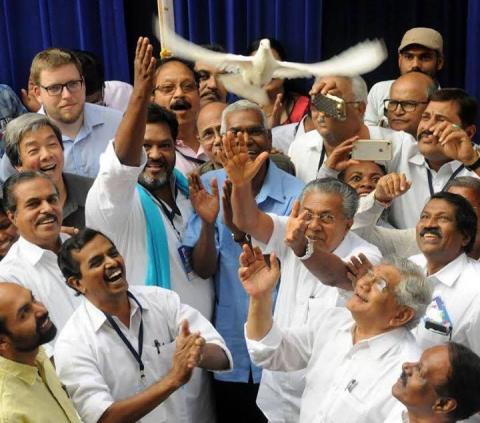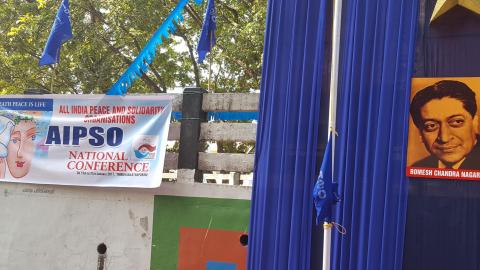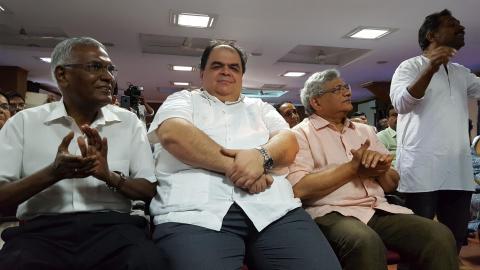Thiruvananthapuram Declaration
Political declaration adopted at the national conference of All India Peace and Solidarity Organisation (AIPSO) which was held at Kerala on 20-21 January 2017:
Thiruvananthapuram Declaration
1. It is with great sense of pride that this National Conference of the All India Peace and Solidarity Organisation (AIPSO) is being held here in Thiruvananthapuram, the capital of Kerala. This is the state with one of the finest histories in the country with the legacy of progressive economic, political, social and cultural traditions in the country. It is a state which has a splendid record of human development of advances in public health and education. It is a state which has created an environment for harmonious co-existence of diverse religious dimensions. It is a state which has taken steps to establish economic equality through agrarian and other economic reforms. It is a state where all-round cultural developments in the sphere of creative arts have attracted attention not just within the country, but the world over.
2. AIPSO is proud of its legacy of combining the best traditions of our anti-colonial national liberation movement and progressive internationalism. AIPSO imbibes the tradition initiated by Raja Rammohan Rai in the early 19th century to express solidarity with the Latin American people’s struggle against Spanish colonialism led by Simon Bolivar. During the most part of our anti-colonial struggle, we did not flinch from supporting important national liberation and anti-fascist struggles, be it in Abyssinia or in Spain. Indian national movement set out an inspiring example of humanitarian solidarity with the Chinese peoples’ struggle for national liberation by sending a medical mission while it was engaged against Japanese aggression. Importantly, in the 40s of the last century, the decision of the West to foist Israel on the Arab people in Palestine no less than Mahatma Gandhi had unambiguously opposed the move and supported the just struggle of the Palestinian people. India similarly made major contributions in the anti apartheid struggle of the South African people. Throughout the Second World War, the Indian national movement while waging its own struggle for emancipation did not abstain from supporting the global struggle against fascism and Nazism and extending its support to the Soviet Union. Within the country, the peace movement has played a crucial role in the consolidation of the process of national independence by throwing its weight behind the struggle for liberation Goa from Portuguese colonialists in 1961.
3. AIPSO also bears the legacy of the global movement for peace of intellectuals, which led to the World Congress of Peace Forces and the formation of the World Peace Council in 1950. Its first President, scientist Nobel Laureate Frederic Joliot Curie’s simple but enduring observation – “Peace is everybody’s business” – continues to be the moving spirit of the peace movement, here in India. AIPSO has continued to be inspired by the evolution of the same spirit throughout it’s almost five decades of existence since its formation in 1972 as an amalgamation of regional focused peace and solidarity bodies. The insight offered by Fidel Castro who is no more has further enriched our understanding – “Peace is not merely the absence of war, but an important pre-condition for development and realisation of the human potential”.
4. AIPSO has been absolutely clear during its entire existence and its present thrust that peace is indivisible. Therefore, the struggle for peace has to be essentially a part of the global struggle against militarism and predatory wars. On the same breath, the AIPSO is also clear that the struggle for peace cannot be divorced from the struggle for solidarity with all those victims who suffer from the forces of aggression, domination and hegemony. It is this clarity that fires us to actively oppose imperialism, colonialism and hegemony because these constitute the biggest threat to peace and interests of overwhelming majority of the people of the world and here in India. Therefore, the slogan that we embrace is “think globally, act locally”.
5. The world has been witness to ravaging wars and destruction through centuries bringing untold suffering for the people by the forces which aim to establish hegemony and control by all means, particularly, through military aggression. Therefore, the AIPSO believes that the fight for just peace cannot be fought by only restricting its opposition to the military form of aggression; AIPSO is equally resolute in fighting all forms of exploitation and domination.
6. The contemporary world shows that without fundamentally eliminating structures of Empire and imperialist domination, just peace cannot be established or sustained. The First World War was a consequence of attempts to force a re-division of countries and colonies. It is in the final stages of that unacceptable consideration that the first socialist nation was born a century back. The Soviet Union was as much a result of a peoples’ urge for peace along with their quest for ‘a loaf of bread’, and ‘a piece of land’. In a sense, very formation of Soviet Union itself was a giant stride in the movement for enduring peace. The Second World War was again an outbreak of the same principle with the additional dimension of a fascist power and its design to dominate the world. The peace movement also had to evolve the additional dimension of imbibing an anti-fascist element in its efforts for establishing peace. The final outcome led, not only to the military defeat of fascism, but also a greatly weakened system of global imperialism. In the next phase, the hope of an enduring peace was dashed by the continuing efforts of imperialism to re-invent itself and carry on through newer instruments of neo-colonialism and subsequent neo-liberal globalization. This re-invention was complemented with the constant attempt to undermine socialism and efforts to end exploitation. The Cold War and the arms race was an inevitable outcome. This phase also saw the extension of the threat of war moving on to design and manufacturing of new armaments and setting out the course for nuclearisation of weapons. Extending chemical and biological warfare, inter-continental ballistic missiles taking aggression right into the outer space were additions to military arsenal. Therefore, the global peace movement, as well as, that in India, had to evolve immediate slogans for universal nuclear disarmament and limiting the specific episodes of escalation. This phase of, what came to be known as Cold War, came to an end with the collapse of Soviet Union. However, the peace dividend which was the ‘noble’ objective which the imperialist camp was projecting never fructified. Instead, the aggressive formation NATO continued with far greater aggressive. This Declaration, therefore, unambiguously demands dismantling of all military bases and universal nuclear disarmament.
7. It is this new phase which has seen the most blatant drive for establishing hegemony over global resources, particularly energy resources. This is accompanied by a new global economic and financial order ordained by international finance capital which is forcing country after country to subordinate national decision making sovereignty to the paradigm of neo-liberal globalization. Unprecedented growth of inequality, unemployment and poverty has been the obvious symptoms of this dehumanising project; so much so, that it raises a serious question mark on this trajectory itself. Therefore, the peace movement both inside the country ,as well as , globally had to respond by engaging in the struggle against this aggressive process of neo-liberal globalization and concretely mobilizing the people against military invasions in Iraq, Libya and Syria and the aggressive domination by the US-led West and Israel to deny and traumatize the people of Palestine. This phase has been also marked by encouragement, abetment and financing by the US-led imperialist camp to forces of sectarianism and fundamentalism to undermine and eliminate progressive and nationalist regimes in different parts of the world. Without the overt and covert involvement of US, Israel, Saudi Arabia and other Gulf monarchies, Taliban, Mujahedeen, Al Qaeda, Al Nusrah, Al Shadab, and Boko Haram could not have spawned, to finally emerge in creating the ultimate monster of extremist fundamentalism - Islamic state. The backlash of growing inequality and disempowerment along with the ugly rise of such retrograde identity assertions have been manifested in the victory of Donald Trump and Brexit.The dark forces of theocracy and fundamentalism are keen on imposing a medieval authoritarian theocratic caliphate in most of West Asia and Northern Africa. Therefore, the peace movement, today, has to contend with not just imperialism but this obnoxious offshoot of religious fundamentalism.
8. Imperialism’s geopolitical strategy does not remain confined to the Middle East. After the debacle in Iraq and Afghanistan, where the forces that it had unleashed imperialism was in no position to completely eliminate violence. In a changed priority of geo-politics, it is now directing the re-configuration of its resources in Asia-Pacific and Eastern Europe. The new direction obviously aims to undermine the growing economic influence of China in the Asia-Pacific and that of Russia in Eastern Europe. The new tensions in South China Sea and in Ukraine are ample testimonies of this new aggressive of US imperialism led west. These attacks force a convergence of these two who are unitedly confronting these unilateral attempts at curving out a unipolar world; and secure the process of multipolarism instead.
9. In Latin America as well, having suffered reverses, from forces that have doggedly fought neo-liberal camp followers in peacefully held elections in Venezuela, Bolivia, El Salvador and Nicaragua. Therefore, the attempt has been to undermine the legitimately elected popular regimes. The coup in Paraguay was a clear case in point. The existence of socialist Cuba and its continuing moral influence in inspiring the struggle for change in the other countries was sought to be undermined through the obnoxious blockade of the island nation. However, the great fight back of the Cuban people and the spirit of regional solidarity and cooperation has foiled most of the imperialist designs. The US administration had to finally accept partial retreat and diplomatic ties had to be restored. But that imperialism is not prepared to reconcile with this immediate set back in the region is also clear from the staging of the coup in Brazil.
10. The changed emphasis of the imperial geo-strategy is now at work in the Asia-Pacific and South Asia. The obsessive drive by US imperialism in this theatre is dictated by its urgency to harness the comparative higher level of growth attained by this region. To ensure that objective, the Empire’s strategy has to focus on containment of China. With reverses in the recent past, that pursuit depends crucially on alliance building. That has led to an aggressive drive to forge a US-Japan- India alliance, a shadow Asian version of NATO. This in its turn has necessitated, interlocking India as a subordinate ally. The signing of Indo- US logistic sharing arrangement and a joint defense partnership has instituionalied this framework. While one can understand US compulsions, India’s abandoning of a non aligned and independent foreign policy position is shocking. Given this, in Asia-Pacific, the main theatre of tension is the South China sea where disputes between China and some of its neighbouring countries over the ownership of two islands was sought to be utilized by US and use the dispute to ensure aggressive naval movements threatening the peace and stability of the region. With signs of attempts to negotiate a reconciliation processes, this declaration hopes that the disputes are addressed and resolved through peaceful dialogue within the framework of international law. In South Asia, the Afghan situation has also stirred up the aggressive activities of fundamentalist forces spilling over generally to the region. The escalation of tension and war mongering in both India and Pakistan is causing grave concern. This tension is also mutually reinforcing divisive and sectarian forces further undermining the unity among the people and making it that much more prone to extremist violence. The rise of Islamic State has made countries with major Muslim population vulnerable to fundamentalist activity and violence.
The situation demands that there should be proper initiatives from all countries of this region to maintain peace and good neighbourly relations. In this context, the urgent need is to take new initiatives for confidence building measures by India, China and Pakistan to address their concerns through dialogue for overcoming differences and conflicts.
11. The Asian Theatre looks tense with growing signs of multipolar assertion. The expanding Chinese economic and financial influence places imperialism under greater stress. That imperialism does not care for degenerating to depths where it can unleash forces of unabashed destruction can be seen from what happened in Libya, Iraq and Syria. Millions of people are forced to flee their home and their homeland. These hapless refugees attempting to migrate to safety in the European mainland are leading to the outbreak of obnoxious racism and neo-fascism.
12. That the global economic and financial order is aggravating the challenges of life and livelihood of the people is clear from the growing inequality with one percent of the global population cornering 53 per cent of global wealth. This sense of insecurity is also reinforcing sectarian and divisive identity politics with huge swathes of territories being drawn into the quagmire of incessant violence.
13. On the other hand, this new phase is also characterized by an offensive use of new technologies in enhancing the lethal effectiveness of the aggressive military machine. Laser technologies for precision targeting, unmanned flying machines like drones, combination of newer communication and information technologies for launching cyber attacks and uncanny invasion into privacy of civilian population of target nations are threatening the basic premise of human rights as enshrined in the UN charter.
14. The development and concentration of powerful global corporate media is another ominous dimension of the emerging reality. The reach and the potential to influence global public opinion have assumed frightening proportion to drum up support for military invasions and politic projects for furthering designs of domination and hegemony. The potential of social media to throw up a challenge to posit alternative narratives exist; however, it is also sought to be severely undermined by giant information corporates like Google and Face book.
15. The unabashed quest for profits promoted by free markets by contemporary neo liberal globalisation has resulted in exploitation of natural resources and the global commons on a magnitude which threatens our environment and ecology to point of peril. Global warming and climate change is actually posing a huge question mark over the very survival of this planet. Accumulated evidence have unambiguously established that this course has directly triggered by the brazen pursuit of profit under imperialist tutelage, opening up the possibility of strong synergy between climate activism and the peace movement.
16. It is in this backdrop of resurgence of extreme rightwing violence and the specter of neo-fascist forces that the threat of a theocratic state looms large on the Indian landscape. The changes that we are witnessing in recent times is no ordinary change of government but a continued State-sponsored attempts to polarize the society and impose religious majoritarianism to fundamentally transform the secular democratic republic into a fascist ‘Hindu Rashtra’. The political objective of Hindutva forces who spearhead this retrograde reversal are also brazenly attempting to impose a retrograde social order targeting social under castes and women, which is often resulting in aggression and violence.
17. The shadow of US imperialism looms in the background which has in the past attempted to destabilize the domestic situation in the country with marked efforts to undermine the progressive forces. It has also encouraged separatist and secessionist forces to balkanize and undermines our territorial integrity. In the present situation, the Empire finds itself emboldened with resurgence of right wing forces who happen to be its natural ally.
18. The situation is particularly vulnerable in the Kashmir valley of Jammu & Kashmir which has emerged as a continued hotspot threatening the borders with Pakistan. The continued cross border terrorism from Kashmir is exacerbating the deepening tension between two nuclear powers. Additionally, the attempted hegemony by the Hindutva forces through the often unconstitutional direction of its initiatives is also reinforcing the forces of fundamentalism and militarism across the border. The idea of a diverse but composite, plural, united and secular India will have to be protected. AIPSO and the peace movement have a great stake in this battle.
19. It is in this context that this Thiruvanathapuram Declaration wants to unambiguously issue a clarion call to our people for joining the battle for peace – within and the world over. This will require the most resolute broadening to embrace all sections who are vitally interested in enduring peace and harmony of the people. It has to also capture the imagination of all whose life, livelihood and dignity stands threatened by growing economic and social inequality. Therefore, the AIPSO would leave no efforts for an unprecedented broadening of its ranks to include all political forces, social movements of the peasantry, trade unions, intellectuals, cultural activists, progressive feminists fighting for gender justice , social justice forces and segments of the society who really strive for not just elimination of aggression and enmity ,but also for establishment of an environment for the fullest development of their potential for attaining a life of dignity.
20. Responding to the present daunting challenges to peace posed by militarism, fundamentalist violence and hegemony AIPSO has to enhance its capacity to address and appeal to far wider sections in a language which ought not to reflect partisan concerns. The AIPSO has to transform itself as a platform of peace activism which is youthful and dynamic. It is clear that with the growing threats which can tear asunder all that we cherish the youth face the gravest threat as they have a long active life to face these adverse conditions. So conversely, it is they who will gain the most if a peaceful order can be established both in India, as well as, the world. In evolving a new language of communication to enhance its outreach exponentially, AIPSO will have to make progressive use of cultural tools updating the glorious tradition of the yesteryears. Concerts for peace, Art for peace, literary, cinema and theater festivals, book publishing, culture jathhas, sports for peace and universal brotherhood in the tradition of the Olympics have to all become essential ingredients for infusing a new vigour and vibrancy into the peace movement.
21. Finally, this Thiruvanathapuram Declaration firmly resolves to initiate the process of mighty struggles for mobilization of the broadest sections of our people based on the broadest possible unity to fight for world peace and to extend its solidarity to all those countries and movements who are fighting for independence, democratic rights of the people and social justice. Changing India for the better, to revitalise the role it played in the past to lend its voice to millions in former colonies and the developing nations for a just and peaceful world order is the living essence of this Thiruvanathapuram Declaration. AIPSO will leave no stones unturned to create a truly powerful platform for just peace and addressing concerns for resolving issues of internal conflicts and discrimination, as well as, livelihood and survival imperatives. Therefore, this Declaration will actively promote independence and multiplicity of voices within the flexible framework of ever broadening unity. The Declaration, therefore, embraces the slogan of ‘Diversity of thought, Unity of action’ as its moving spirit it the difficult but entirely possible endeavour that we will embark upon.









